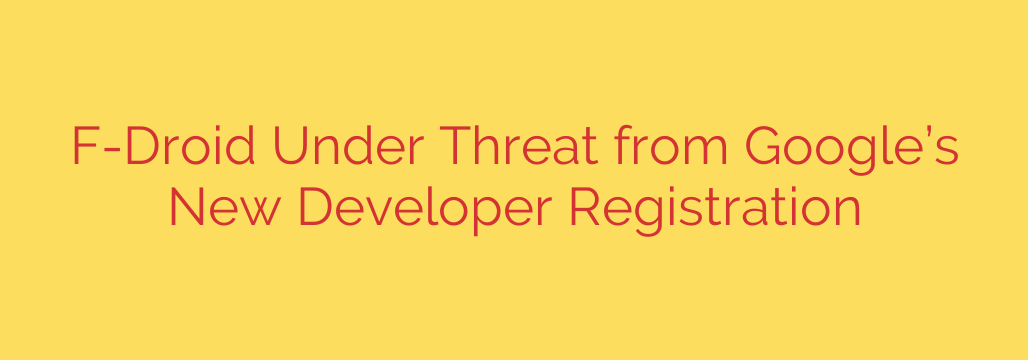
Google’s New Developer ID Mandate: A Challenge for Privacy and Open Source on Android
The digital landscape of Android is constantly evolving, often in the name of enhancing user security. A significant new policy from Google, however, is raising serious concerns within the open-source community, threatening the very principles that platforms like F-Droid are built on. While aimed at curbing malicious apps, this new developer verification requirement could have profound and chilling effects on developer privacy and the future of alternative app ecosystems.
What is Changing in the Google Play Store?
Google is updating its Play Console requirements, mandating that all developers verify their identity to publish or update apps. This isn’t just a simple email confirmation; the new policy requires concrete, verifiable identification.
Here’s a breakdown of the new rules:
- For individual developers: You will need to provide a government-issued ID to verify your name and address.
- For organizations and businesses: You will be required to provide a D-U-N-S number, a unique nine-digit identifier for businesses provided by Dun & Bradstreet.
Google’s stated goal is to increase transparency and accountability, making it harder for bad actors to publish malware or scam apps and then disappear. By tying every app to a verified identity, the company hopes to build a more trustworthy ecosystem for users. However, this one-size-fits-all approach to security overlooks a critical segment of the developer world: the privacy-conscious and open-source communities.
The Unintended Consequences for Open-Source Developers
The world of free and open-source software (FOSS) often operates on principles that stand in direct contrast to this new mandate. For many developers, privacy and the ability to contribute anonymously are not just preferences—they are necessities.
Consider these scenarios:
- A developer living under an authoritarian regime might create an app that supports free speech or helps citizens circumvent censorship. Tying their real-world identity to such an app could put them in serious personal danger.
- An employee at a large tech company might contribute to a competing open-source project in their spare time, preferring to keep their professional and personal activities separate.
- Many developers simply believe in the philosophical ideal of privacy and do not want to hand over their personal identification documents to a large corporation to participate in the app ecosystem.
This new policy effectively forces developers to choose between the massive distribution platform of the Google Play Store and their fundamental right to privacy. This is a choice many in the FOSS community are unwilling to make, and it threatens to create a deeper divide in the Android world.
How F-Droid and Alternative Platforms Are Threatened
F-Droid is a well-respected, community-maintained software repository for Android that exclusively hosts free and open-source applications. It is a haven for users who want to avoid Google’s tracking and for developers who believe in software freedom.
The threat from Google’s policy is twofold. First, it directly impacts any F-Droid developer who also wishes to publish their app on the Play Store for broader reach. They will now be forced to de-anonymize themselves. This may cause many to abandon the Play Store entirely, reducing the visibility of excellent, privacy-respecting apps for the average user.
Second, it reinforces the idea of a centralized, “walled garden” ecosystem controlled by a single corporate entity. F-Droid represents a decentralized, community-driven alternative. By creating high barriers to entry that clash with the open-source ethos, Google’s policy indirectly weakens these alternatives and consolidates its control over the Android app landscape. The policy pressures the entire ecosystem to conform to a single, corporate-defined standard of identity and trust.
Actionable Security Tips for Every Android User
While these policy changes unfold, it’s more important than ever to be proactive about your digital security and privacy.
- Understand Your App Sources: Know where your apps are coming from. The Google Play Store is the default for most, but alternatives like F-Droid offer a curated selection of open-source apps that are vetted for trackers and malicious code.
- Scrutinize App Permissions: Regardless of the source, always review the permissions an app requests. A simple calculator app should not need access to your contacts or location. Modern Android versions give you granular control over these permissions.
- Explore Open-Source Alternatives: If you are concerned about privacy, consider seeking out FOSS alternatives for your essential apps. Many offer the same functionality as their mainstream counterparts without collecting your personal data.
- Stay Informed: Keep up-to-date on changes to platform policies. Understanding the rules that govern your digital life is the first step toward making informed choices about the software you use.
The Future of Android App Freedom
The tension between platform security and developer freedom is not new. While combating malware is a laudable and necessary goal, the methods used to achieve it matter. A policy that forces the surrender of personal identity as a prerequisite for participation risks silencing important voices and shrinking the vibrant, diverse world of independent software development.
As this new verification mandate rolls out, the Android community faces critical questions about its future. Will it remain an open platform that welcomes all developers, or will it become an increasingly closed ecosystem where anonymity is impossible and corporate verification is the only key to entry? The answer will shape the choices available to billions of users for years to come.
Source: https://www.bleepingcomputer.com/news/security/f-droid-project-threatened-by-googles-new-dev-registration-rules/








